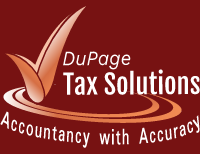
Tax and Accounting Services
About DuPage Tax Solutions
DuPage Tax Solutions is located in Naperville, IL. Our clients are mostly residents and small businesses within the Chicago metropolitan area – DuPage, Cook, Will, and Lake counties. Our remote work capabilities allowed us to extend our services nationwide. Today, we pride ourselves in having clients from all 50 states. Our virtual services are fast, easy, and convenient. Clients submit and review documents electronically through our secured online portal.
Pass-Through Entities: What Are They?

Pass-through entities – also known as flow-through entities – are a popular choice for small business owners due to their tax advantages and asset protection features. But what exactly are they, and how do they compare to other business structures? This post explores their definition, tax treatment, pros and cons, and whether they might be the right choice for you.
Home » Pass-Through Entities: What Are They?
What Are Pass-Through Entities?
Pass-through entities are business structures where income, losses, credits, and deductions “pass through” to the owners. Owners pay their individual tax rate on their share of the profits, avoiding business-level taxation.
Pass-through entities include:
- Sole proprietorships
- Partnerships (General, Limited, and Limited Liability Partnerships)
- Limited Liability Companies (LLCs)
- S corporations
Note that C Corporations are not pass-through entities. Their profits are subject to a 21% flat corporate tax rate before distribution to the owners.
Taxes Involved With Pass-Through Entities
While flow-through entities are not subject to federal income tax, the tax obligations for owners vary based on the type of entity:
- Single-Member LLCs and General Partnerships: Owners must pay 15.3% self-employment taxes on the company’s profits they report.
- Limited Partnerships: Limited partners only pay self-employment taxes on guaranteed payments, similar to receiving a salary.
- S Corporations: Owners do not pay self-employment taxes on distributions. However, they are required to receive a reasonable salary when the business is profitable, and this salary is subject to payroll taxes.
State Tax Treatment of Pass-Through Entities
Some states impose business-level franchise taxes on pass-through entities. Additionally, many states allow these entities to elect a Pass-Through Entity Tax (PTET). With the PTET, owners can bypass the $10,000 state and local tax (SALT) deduction cap on personal returns. Also, the PTET is deductible on the business return, providing potential tax savings. Whether this election is beneficial depends on individual circumstances.

Pros of Pass-Through Entities
Avoidance of Double Taxation: Unlike C Corporations, pass-through entities do not pay federal taxes at the business level.
Flexible Tax Treatment: LLCs can be taxed as a sole proprietorship, S Corporation, or C Corporation, offering flexibility.
Personal Asset Protection for Certain Structures: LLCs, limited partnerships, and S Corporations protect personal assets from business liabilities. However, sole proprietorships and general partnerships do not offer personal asset protection.
Qualified Business Income (QBI) Deduction: Eligible owners can claim a 20% deduction under the Tax Cuts and Jobs Act of 2017. However, this deduction may be limited for owners of specified service trades or businesses (SSTBs) exceeding certain income thresholds.
Learn more about the Qualified Business Income Deduction.
Cons of Pass-Through Entities
Undistributed Income Is Still Taxable: Owners must report their share of profits on personal tax returns, even if they don’t receive the income. This can result in owing taxes on income that hasn’t been received in cash.
Limited Capital Raising Options: Unlike C Corporations, pass-through entities (except S Corporations) cannot issue stock. However, S Corporations are limited to one class of stock, restricting flexibility.
Is a Pass-Through Entity Right for You?
Pass-through entities offer attractive tax advantages and asset protection, making them ideal for many small businesses. However, the best choice depends on your unique financial goals and business plans.
Consult DuPage Tax Solutions to ensure your business structure aligns with your needs and maximizes tax benefits.
You May Also Like These


Top Tax Mistakes Business Owners Make

Cash Flow Made Simple

Home Office Tax Rules to Know
Ready to Take Control of Your Finances?
Contact us today for personalized tax, accounting, and advisory services tailored to your needs. Let’s work together to achieve your financial goals!

Contact Info
Ph. (630) 909 9700
Email: DPTax@DP-Tax.com
Mail address:
1552 Illinois Rte 59 #1037
Naperville, IL 60564
Business Hours
Mon: 11 am – 7 pm
Tue: 11 am – 7 pm
Wed: 11 am – 7 pm
Thu: 11 am – 7 pm
Fri: 11 am – 7 pm
Sat: 12 pm – 5 pm
Sun: CLOSED
Helpful Links
© 2024 DuPage Tax Solutions | Site Map | Privacy Policy | Disclaimer
